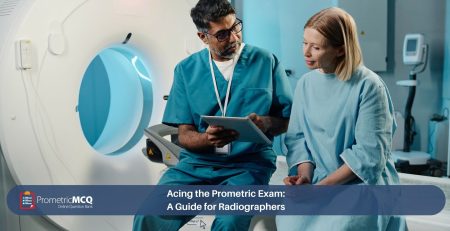
Common Prometric Exam Mistakes and How to Avoid Them
fatima@prometricmcq.com2025-09-26T20:51:57+00:00Table of Contents
ToggleCommon Prometric Exam Mistakes and How to Avoid Them (2025)
Every year, thousands of highly intelligent and dedicated healthcare professionals fail their Prometric licensing exams. The reason is often not a lack of clinical knowledge, but a series of common, avoidable mistakes in their preparation and execution strategy. The path to securing a license to practice in a top-tier healthcare system—be it the DHA, MOH, SCFHS, QCHP, or NHRA—is littered with the same predictable pitfalls. Recognizing and actively avoiding these errors is just as important as mastering the syllabus itself.
A Prometric exam is more than a test of what you know; it is a test of how you think, how you prepare, and how you perform under intense pressure. The difference between a “Pass” and a “Fail” often comes down to strategy. Candidates who pass are those who understand that they are training for a mental marathon, not just a knowledge quiz. They avoid the traps of passive learning, poor time management, and last-minute panic, instead adopting a methodical and resilient approach.
This ultimate 2025 guide is a deep dive into the most common mistakes candidates make and, more importantly, a strategic playbook on how to avoid them. We will break down critical errors made during the preparation phase, inside the testing center, and on the day of the exam itself. Supported by a comprehensive 10-point FAQ, this guide will arm you with the foresight needed to navigate your preparation journey flawlessly. By learning from the missteps of others, you can build a bulletproof strategy to ensure your success.
Key Takeaways on Avoiding Prometric Mistakes
- Preparation is Strategy, Not Just Hours: The quality and method of your study are more important than the sheer number of hours you put in.
- Active Learning is Non-Negotiable: The single biggest mistake is passive reading. Success comes from actively solving questions.
- Mock Exams are a Dress Rehearsal: Failing to simulate the real exam experience is a recipe for exam-day anxiety and poor pacing.
- Mindset Matters: Confidence, resilience, and a calm approach are as critical as clinical knowledge.
- Logistics Can Make or Break Your Day: Small oversights in planning can lead to major, unnecessary stress.
Part 1: The Preparation Pitfalls (Mistakes Made Before Exam Day)
The foundation of your success is built in the months leading up to the exam. The most critical errors happen here.
Mistake #1: The Illusion of Passive Learning
The Mistake: Spending 80% of your study time passively reading textbooks, watching video lectures, or highlighting notes. While this feels productive, it creates a false sense of mastery. Passive learning is poor at building the skills needed for a high-stakes MCQ exam: active recall, clinical reasoning, and application of knowledge.
The Solution: Embrace Active Recall. Flip your study ratio. Spend at least 80% of your time in a high-quality question bank (QBank). Every question you solve forces your brain to retrieve information, analyze a scenario, and make a decision—the very skills the exam tests. Use textbooks and videos as reference tools to clarify concepts you struggle with in the QBank, not as your primary study method. This is the core of effective DHA Prometric exam preparation and all other licensing tests.
Mistake #2: The “Winging It” Approach to a Study Plan
The Mistake: Studying without a structured, written-down plan. This leads to randomly jumping between topics, spending too much time on areas you enjoy, and neglecting high-yield but difficult subjects. By the time the exam is near, you realize there are massive gaps in your knowledge.
The Solution: Create a Detailed, Subject-Based Schedule. Divide your preparation into blocks (e.g., Cardiology, Infectious Diseases, etc.). Allocate a specific number of days or weeks to each block. Your schedule should detail what you will study each day and, crucially, should be realistic. Build in buffer days and scheduled breaks to prevent burnout. A well-crafted plan provides discipline and ensures comprehensive syllabus coverage.
Mistake #3: Relying on Low-Quality or Outdated “Dumps”
The Mistake: Searching for “exam dumps” or using free, unverified question sources. These materials are often outdated, contain incorrect answers, and promote rote memorization instead of genuine understanding. Relying on them gives a dangerously false sense of security.
The Solution: Invest in One High-Quality, Reputable Resource. Your primary tool should be a professional, regularly updated QBank from a trusted provider. These resources are written by subject matter experts, feature questions that mimic the style and difficulty of the real exam, and provide detailed, evidence-based rationales. Quality trumps quantity every time. A premium QBank is an investment in your career. Explore vetted MCQs Packages to see what a professional resource looks like.
Part 2: The In-Exam Errors (Mistakes Made During the Test)
You can have perfect knowledge, but if you make strategic errors inside the Prometric center, you can still fail.
Mistake #4: Neglecting Time Management Practice
The Mistake: Never practicing under timed conditions. The Prometric exam is a race against the clock. Having to answer 100 or 150 complex questions in a limited time requires a practiced rhythm. Going in without a pacing strategy leads to spending too long on hard questions and rushing through the easy ones at the end.
The Solution: Make Timed Mock Exams a Non-Negotiable Ritual. In the final 6-8 weeks of your prep, you must regularly take full-length, timed mock exams. This builds mental stamina and allows you to perfect your pacing. The goal is to develop an internal clock, knowing instinctively when to move on from a difficult question. This practice is the only way to make the real exam feel like just another simulation.
Mistake #5: Misreading the Question Stem
The Mistake: Rushing and misinterpreting what the question is actually asking. This is a heartbreaking error because you may know the correct information but still get the question wrong. Common tripwires include missing keywords like “EXCEPT,” “NOT,” “LEAST likely,” or confusing “initial diagnosis” with “definitive diagnosis.”
The Solution: Read the Last Sentence First. Before you even read the clinical scenario, read the final sentence of the question stem. This tells you your objective (e.g., find the diagnosis, the treatment, the side effect). Then, as you read the vignette, you can actively search for the specific information needed to answer that precise question. This simple trick dramatically improves focus and accuracy.
Mistake #6: Panicking and Wasting Time on “Impossible” Questions
The Mistake: Encountering a question on a topic you’ve never seen before and letting it derail you. You panic, your confidence plummets, and you waste 5-10 precious minutes trying to figure it out, which negatively impacts your performance on the next several questions.
The Solution: The “Flag, Guess, and Move On” Technique. Accept that you will not know the answer to every question. It’s by design. When you hit a wall, immediately use the process of elimination to remove any obviously wrong answers. Make your best-educated guess from the remaining options, flag the question to review later if you have time, and move on. Do not let one question sabotage your entire exam.
Part 3: The Logistical Lapses (Mistakes on the Day Itself)
These are the unforced errors that can add immense, unnecessary stress to an already high-pressure day.
Mistake #7: Sacrificing Sleep for Last-Minute Cramming
The Mistake: Believing that an all-night cramming session will be more beneficial than a full night’s sleep. This is scientifically incorrect. Sleep is when your brain consolidates memory and restores its cognitive function. Arriving at the exam sleep-deprived severely impairs your critical thinking, problem-solving speed, and recall ability.
The Solution: Protect Your Sleep at All Costs. Make getting 7-9 hours of quality sleep the night before your exam your number one priority. Put away your study materials by the early evening and engage in a relaxing activity. A well-rested brain is your most powerful weapon. For more on the science of learning and memory, resources from academic institutions like Stanford Medicine are insightful.
Mistake #8: Ignoring Exam Day Logistics
The Mistake: Not confirming the test center location, not knowing the route, and, most critically, forgetting or bringing the wrong form of identification. Showing up late or being turned away because your passport name doesn’t exactly match your registration is a devastating and completely avoidable failure.
The Solution: Do a Full Logistics Drill the Day Before. Confirm the address. Plan your route and add a generous time buffer. Lay out your clothes. Most importantly, find your original, valid passport and place it with your confirmation email. Control every controllable variable so that on exam day, your only focus is the test itself.
Frequently Asked Questions (FAQs) on Avoiding Exam Mistakes
The overwhelming consensus is Mistake #1: Passive Learning. Candidates who spend the majority of their time reading instead of actively solving questions from a QBank are often shocked to find they cannot apply their knowledge under pressure. Active recall is the key to success.
You are likely not practicing the “Flag, Guess, and Move On” technique. You are spending too long on difficult questions. The goal is not to get every question right, but to answer as many questions correctly as possible within the time limit. Bank the easy points first.
High-quality resources, especially QBanks, will have several features: questions that are case-based and require clinical reasoning, detailed rationales that explain every option, regular content updates based on new guidelines, and performance analytics to track your progress. Avoid resources that focus on simple recall questions.
It can be. You should only change an answer if you have a concrete reason to do so (e.g., you misread the question the first time or another question provided a clue). Changing answers based on pure anxiety or “second-guessing” often leads to changing a correct answer to an incorrect one.
By building a realistic schedule that includes mandatory breaks. Schedule at least one full day off per week. Incorporate daily exercise, maintain a healthy diet, and get enough sleep. Burnout is a result of unsustainable habits; a balanced plan prevents it.
This is a common anxiety response. Take a 30-second reset. Close your eyes, take three slow, deep breaths, and then re-read the question, starting with the last sentence first. This breaks the panic cycle and allows you to re-engage with the problem logically.
Yes, to an extent. While you should dedicate extra time to your weak areas, don’t completely neglect your strong subjects. A spaced repetition approach, where you periodically review strong topics, is essential to keep that knowledge fresh and ensure you don’t lose easy points on exam day.
Because the distractors are designed to be plausible. They often represent common misconceptions or alternative diagnoses. By understanding why they are wrong, you are learning the subtle but critical differences that separate one condition or treatment from another. This deepens your clinical judgment.
Do not try to fix it. Immediately raise your hand and notify the Test Center Administrator. They are trained to handle technical issues. They will document the problem, and if any time is lost, they can usually resolve it.
While individual learning styles vary, the most universally successful strategy is one centered on active learning. A comprehensive Prometric exam preparation plan will always prioritize solving and reviewing MCQs over any other method.
Conclusion: Turning Mistakes into Stepping Stones
Success in a high-stakes Prometric exam is a science. It is about systematically eliminating the errors that trip up so many well-intentioned candidates. By understanding these common pitfalls—in preparation, in practice, and on the day itself—you can build a strategic, resilient, and virtually foolproof plan. Forewarned is forearmed. Use this guide as your checklist to ensure that on exam day, the only thing being tested is your clinical knowledge, not your resilience to avoidable mistakes.
Ready to Build a Mistake-Proof Preparation Strategy?
Our comprehensive MCQ packages are built on the principles of active learning and realistic simulation. They provide the high-quality questions, detailed rationales, and timed mock exams you need to master the content and the strategy, ensuring you pass with confidence.










